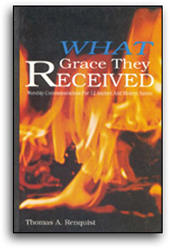SermonStudio
The Great Heart Of Neuendettelsau
Worship
What Grace They Received
Worship Commemorations For 12 Ancient And Modern Saints
Reader 1: In 1808 in Germany, Wilhelm Loehe was born into a pious Christian family with deep roots in the Lutheran church. At the very early age of eight, Loehe decided that he would become a pastor; and his mother, by then a widow, saw to it that he received the necessary education.
The Lutheran Church in Germany at this time was still very much dominated by rationalism, a movement which emphasized the mind over the spirit and neglected the evangelical and missionary thrust of the church. At the time of his ordination, Loehe wrote:
The Lutheran Church in Germany at this time was still very much dominated by rationalism, a movement which emphasized the mind over the spirit and neglected the evangelical and missionary thrust of the church. At the time of his ordination, Loehe wrote:


